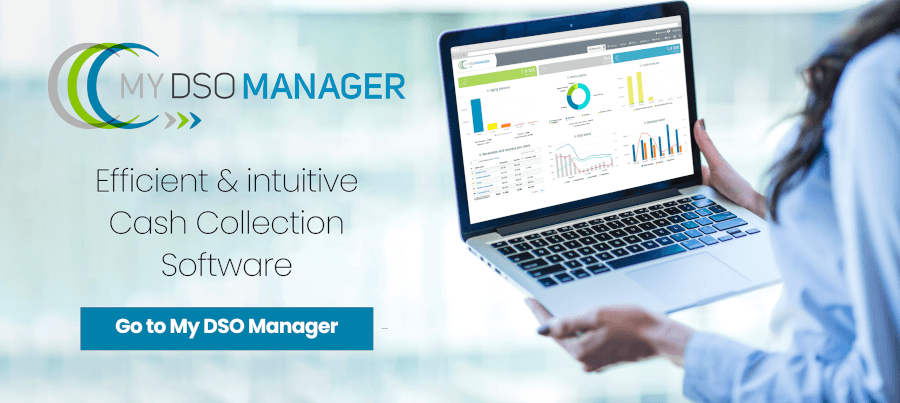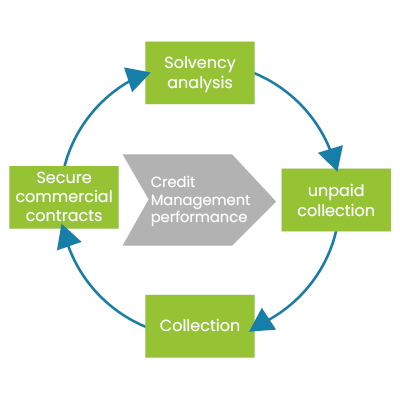Indeed, the challenges of credit management are multiple and essential for any commercial organization: improving cash flow and profitability, preserving customer satisfaction, increasing the credibility of its company vis-à-vis its customers and partners, are all elements directly concerned by the management of customer accounts.
What is credit management?
It is actually a very down-to-earth job whose purpose is the raison d'être of any company and any work whatsoever: Get the income of its labor, which is to say in the economic world we have lived for the past few centuries: to be paid by its customers! This concept is fundamental to the sustainability and development of any business.It seems obvious! In fact, it is not! Achieving this objective: "to be paid by your customers", implies that numerous intermediate steps, which concern the entire sales process, are successfully completed.
Hundreds of thousands of companies disappear every year in the world because they suffer from chronic unpaid or late payments. Much more are impacted in their financial performance and development for the same reason. It is the same in all countries around the world.
Why do we hear little about Credit Management?
Credit Management is particularly developed in large companies around the world. It is not the case in small and medium companies, especially in Latin countries where businesses are culturally focused on sales and tend to neglect this critical management.This situation is totally paradoxical because the specialists in the Trade Receivable management, the credit managers, are absent where they would be most needed: in the SMEs and SMIs, which are the most fragile companies in cases of unpaid debts and late payment
-

My DSO Manager, the innovative credit management software
My DSO Manager offers a set of powerful features to manage accounts receivable and to improve working capital.
It includes innovative and digital functions for credit management and cash collection: credit risk, collection, dispute management, forecast, intelligent scenarios and workflows, etc., change the game for credit manager.
Implementation is done quickly thanks to our Smart upload module. My DSO Manager is used in 85 countries, manages all currencies and provides with consolidated reports in real time. See more with the online demo.So why do we grant a payment term to our customers?
The reason is first of all historical and dates back to antiquity and the beginnings of commerce. The slow transport and communications imposed a lag between the delivery of goods and payment.Nowadays, it is so obvious to invoice with a payment term that we don't realize what that means: a transfer to your customer of a vital element of your business: cash. Means of payment widely used today such as documentary credit and bills of exchange have their origins in the different eras of development of international trade.
Means of payment widely used today such as documentary credit and bills of exchange have their origins in the different eras of development of international trade.
Either you place absolute trust in your customers, their organization and their finances, and pray that they pay you, or you do credit management.What does the Credit Manager do?
He is involved in the entire sales process of the company, from commercial prospecting to final payment of invoices. He works in collaboration with the sales department and the legal department. He is responsible for the proper management of customer outstandings, i.e. the turnover achieved and not yet paid.
Read our article Credit Manager: Anatomy of an unusual species.
The Credit Manager intervenes in the full sales process of the company, from commercial prospecting to the final payment of invoices. She or he works in collaboration with the sales department and the legal department, is responsible for the good management of outstanding customer, that is to say the turnover recognized and not yet paid.
Sales process steps:Pre-prospection
- Determination of customer segments and types of associated risks.
- Setup of standard payment terms (payment terms, payment method)
- Contribution to the realization of the sales conditions, including key clauses (payment term, late payment penalties, clause of reserve of property, etc.).
- Realization of a Credit Management procedure defining transversal operating rules in the company.
Prospection
- Rating the creditworthiness of customers.
- Set up the credit limit based on business needs and the credit analysis done.
- Negotiation and validation of the payment deadline granted as well as the means of payment.
- Orientation of commercial efforts towards solvent prospects.
Contractualization
- Ensure the balance of the contract regarding the level of reciprocal commitments between the seller and the buyer (limits of responsibilities).
- Negotiation of payment terms (down payments, billing terms).
- Integration of standard contractual clauses (retention of title, suspension and cancellation clause, penalties for late payment, etc.)
Billing
- Validation of the process of issuing invoices (who invoices, on what order and how, compliance with the terms of the contracts, etc.).
- Validation of the content of invoices compared to the legal constraints (tax number, mentions about late payment penalties rate, etc.)
- Management of billing disputes with the aim of resolving them as quickly as possible and to carry out the corrective actions to no longer reproduce the error.
Cash collection
- Management of cash collection, which aims to obtain payment of invoices on their due date applying collection scenarios. It begins with a preventive recovery action (before invoice due date) and continues until the sending of a formal notice, required for any legal action.
- Management of litigation recovery actions with appropriate legal actions carried out directly or through a collection agency, a credit insurance or other provider.
Performance and optimization of the WCR
- Definition of an Accounts Receivable management strategy to reduce the Working Capital Requirement
- Monitor the performance with the appropriate indicators (DSO, overdue percentage, bad debt rate, etc.).
- Carry out predictive analyzes of cash receipts in order to feed the company's cash flow forecasts.
 The sustainability of your business, its profitability, its cash flow, and its ability to grow by its own financial resources partially depends on the performance in credit management.
The sustainability of your business, its profitability, its cash flow, and its ability to grow by its own financial resources partially depends on the performance in credit management. The role of the credit manager also extends to AR accounting (invoice / receipt reconciliations, management of bad debt provisions, etc.) and to IT (ERP, credit management software), which are the tools that allow him to work efficiently.
The role of the credit manager also extends to AR accounting (invoice / receipt reconciliations, management of bad debt provisions, etc.) and to IT (ERP, credit management software), which are the tools that allow him to work efficiently.Credit management using digital communication tools
The credit manager fills the no man's land between the financial and commercial departments of his company, and between his company and customers. Its role is above all to streamline communication between these different actors on the issues linked to his job and on the content: financial information, credit analyses, account statements, PDF of invoices, dispute files, etc.
In order to lead to fulfills its mission, it must ensure that each actor in the commercial relationship has the information they need at their disposal to act and resolve the problems and frictions that slow down the payment of invoices.
For this, digital tools: electronic document management, Credit management softwares, portals, problem-solving and decision validation workflows are essential, so much so that doing without them amounts is a return (or a stay) to the stone age of the credit management. The gains from digitalization are for him exponential and all-round: efficiency, capacity of projection, implication.
Automation frees him from tasks that need to be done to focus there where his expertise is essential. Digitalization, as a human enhancer, radically changes the situation for this function which can finally find its full and complete place in the company.Evaluate your performance in Credit Management
Function resolutely transverse, its performance brings together many departments of the company, from trade to accounting, from logistics to after-sales service. It is in the entire sales process that the keys to improvement are.
The Accounts Receivable are a transitional item. Invoices are not intended to stay as they are cleared as soon as they are paid by the customer. Therefore, AR can be seen as a box in which all invoices corresponding to cases that have been mismanaged at one or more stages of the sales process fall: poor customer risk analysis, poor contractualization, poor payment terms, supply chain problems, poor recovery, etc.
All these reasons result in the increase of the AR, the increase in the WCR, and the decrease in cash and profitability.
Improving performance means reworking each stage of the sales process. We call it the "quote to cash" process (from the realization of the quote to the payment of invoices).Performance evaluation is done by combining several indicators with, for example: No fatalism, the keys to the cash of his company (to be paid quickly and well), its profitability (avoid bad debts) are held by its leaders and employees, who alone do or do not take the necessary steps of an efficient credit management.
No fatalism, the keys to the cash of his company (to be paid quickly and well), its profitability (avoid bad debts) are held by its leaders and employees, who alone do or do not take the necessary steps of an efficient credit management.- The DSO.
- The The collection efficiency rate.
- The rate and amount of credit risk, or conversely the coverage rate of customer outstandings.
- The WCR, by isolating the part that goes to the Trade Receivable.
- The average duration of resolution of disputes.
- The overdue rate or its opposite the % current.
- The unpaid rate.
